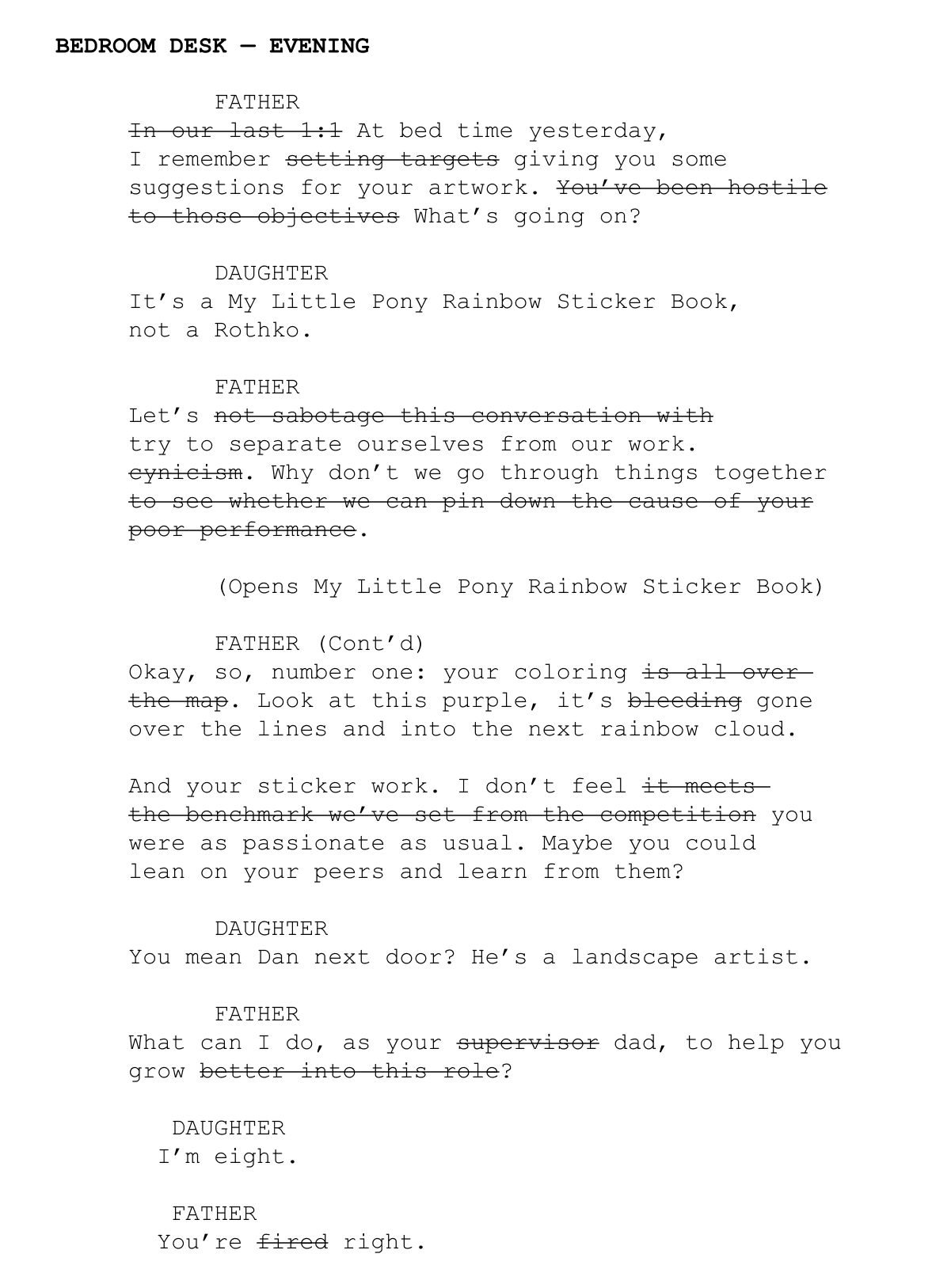Time to Rename Beauty SHOT?

Remember when you divided and conquered as a task force to tackle a problem? Or when the team toyed with the idea of guerilla marketing? (Didn’t last, management shot that down pretty quick.) Or the conference in Lisbon when you were blown away? What’s that? You’d like to take a stab at writing a newsletter someday? There are copywriter boot camps for that.
We’re going to be direct: violence is entrenched in our vocabulary. Maybe it’s the times—movements of kindness around us make our sensitivity to violence flare up even brighter. It’s the content we see, the games we play, the thoughts we wish we didn’t have. There is violence, and we are using it in the way we write. And there is no bigger stage than the theater of work.
We tell our colleagues to shoot us an email. We set deadlines and look for a silver bullet. We kill pieces, take our best shot, think about our target audience, and defend our market positions. Then we execute a plan. But be careful, it’s a legal minefield out there.
This is military speak, and it’s choking the better parts of who we are. So what do we do instead of turning on the corporate commando? We lie down. We turn to vanilla platitudes to seem fairer, harmless, without any signs of aggression. It’s so flagrant that we’ve become no better than a big blank page in camouflage.
“Your job advert immediately caught my eye because it resonates perfectly with my background and career aspirations” should never be a phrase again. “Dear all” is a dagger to the soul. And “I hope this email finds you well” will find a special place in the mausoleum of You could’ve done better with that phrase. Because as hard as we try, this isn’t the language of peace, it’s the communication of cowards.
They’ve moved the goal posts. → This feels unfair.
Do we have the bandwidth? → Can we honestly handle this?
Let’s double-click on that. → Wait, this sounds important.
Can we download first? → Let’s make sure we understand each other.

In her piece “Garbage Language: Why do corporations speak the way they do?” Molly Young tells us that these words and expressions are “… all fakery and puffery and lack a reason to exist. It has always been obvious that if everyone agreed to use language in the way it is normally used, which is to communicate, the workday would be two hours shorter.” Perhaps the shorter workweek should begin with an economy of empty words.
The language we’re using is also the culprit of alienation and noninclusion within the workplace. Several scientists have joined efforts to analyze a large dataset of performance evaluations and explore the ways in which leadership attributes were assigned. They were surprised to discover strong gendered language in subjective leader evaluations. While men were most frequently described as “analytical,” women were “compassionate.” The most common negative term for men was “arrogant,” while for women it was “inept.” And overall, women were assigned significantly more negative attributes.
So the question is: given the choice, would you hire a compassionate person, or rather, an analytical one? Is one attribute more valuable than the other?
Professional coaches also notice a general pattern amid genders: while women desire connection from conversation, men more often desire independence. This explains why women feel uncomfortable in such linguistic environments as described above. To them, the softening of language is natural when the goal is inclusion. And yet, when using such language—starting sentences with “In my opinion,” for instance—they are more likely to be perceived as passive, indecisive, or weak.
Is there a way for us to speak a more inclusive and non-violent language at work? Does the beautiful language of business even exist?
First, we tried an experiment. What if we spoke to our friends and family like we speak to our colleagues? Consider the following scene, loosely transposed from the world of work.

If the language of work is now piloting the language of our daily lives, then we may need to rethink the rules of language in the workplace. And so we’ve begun to give it some thought.
Here are 11 areas where we can start making the language of work more beautiful.
1. Write your truth
Your writing should sustain you first, as there is a true sense of pleasure that’s read between the lines of a genuine piece of writing. Be honest, be genuine, be yourself. Canned phrases expire, personal writing lives on in the reader’s mind.
2. Tell stories
Stories protect us, they call up a framework that’s been worked into us through generations (setup → disturbance → satisfying end). Our ears are used to that. Because if a picture says a thousand words, a story will cut a few hundred from the word count. And in 2022, economy of words wins the day.
3. Emphasize the positive
We prefer to be with positive people. A text or conversation is no different. Starting phrases or ideas with negations can sap an audience.
4. You are beautiful
Aside from someone’s name, the word “you” is the sweetest thing most people will hear. It makes them pause for a moment to feel touched and talked about. Contrary to “I” which when popcorned around, can come across as conceited.
5. Cut the corporate bullshit
We can do better than “closing a loop” and “scheduling a follow up.” Corporate neologisms—let’s “take them offline.” Forever.
6. Go for gender-neutral communication
When in doubt, use “they” as the singular pronoun and gender-neutral titles such as chairperson, letter carrier, member of congress, etc.
7. Be gentle
These are delicate times and ideas need to be presented with care. Phrases like “Consider making these changes” are better received by using “I feel we could …” And be compassionate, as it’s difficult to militarize compassionate language. Write with the reader in mind, their struggles, their needs, their best intentions. Angry? Add some space. Take time to reply or speak. Let your answers breathe as long as they need to.
8. Use mindful vocabulary
Words carry history, and history is political. Consider the weight that your words may have. We don’t know the origin of some words and how they can offend others, like using oppressor language without knowing it.
9. Choose non-verbal cues
A gesture of appreciation can be more powerful than more and more words. And better understood on a human level.
10. Disagree without judgment
Use phrases like “I notice that…,” “Would you be willing to…,” or “I’m curious about…,” and assume someone’s best intent when discussing issues. We’re all here trying to do good.
11. Choose language with no force of action
Instead of “reinforcing” and “defending” we could “support” and “sustain.” In last week’s Resident Circle, Chris West, author of Strong Language, noted that “we exist through the metaphors we use, so who we are is also reflected in the language we speak.”

